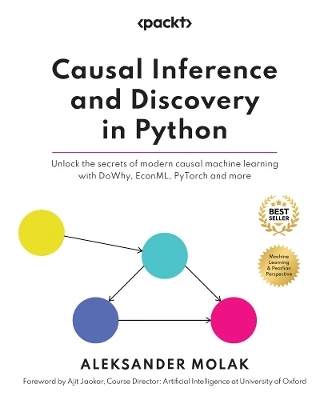
Causal Inference and Discovery in Python
Packt Publishing Limited (Verlag)
978-1-80461-298-9 (ISBN)
Purchase of the print or Kindle book includes a free PDF eBook
Key Features
Examine Pearlian causal concepts such as structural causal models, interventions, counterfactuals, and more
Discover modern causal inference techniques for average and heterogenous treatment effect estimation
Explore and leverage traditional and modern causal discovery methods
Book DescriptionCausal methods present unique challenges compared to traditional machine learning and statistics. Learning causality can be challenging, but it offers distinct advantages that elude a purely statistical mindset. Causal Inference and Discovery in Python helps you unlock the potential of causality.
You’ll start with basic motivations behind causal thinking and a comprehensive introduction to Pearlian causal concepts, such as structural causal models, interventions, counterfactuals, and more. Each concept is accompanied by a theoretical explanation and a set of practical exercises with Python code. Next, you’ll dive into the world of causal effect estimation, consistently progressing towards modern machine learning methods. Step-by-step, you’ll discover Python causal ecosystem and harness the power of cutting-edge algorithms. You’ll further explore the mechanics of how “causes leave traces” and compare the main families of causal discovery algorithms. The final chapter gives you a broad outlook into the future of causal AI where we examine challenges and opportunities and provide you with a comprehensive list of resources to learn more.
By the end of this book, you will be able to build your own models for causal inference and discovery using statistical and machine learning techniques as well as perform basic project assessment.What you will learn
Master the fundamental concepts of causal inference
Decipher the mysteries of structural causal models
Unleash the power of the 4-step causal inference process in Python
Explore advanced uplift modeling techniques
Unlock the secrets of modern causal discovery using Python
Use causal inference for social impact and community benefit
Who this book is forThis book is for machine learning engineers, researchers, and data scientists looking to extend their toolkit and explore causal machine learning. It will also help people who’ve worked with causality using other programming languages and now want to switch to Python, those who worked with traditional causal inference and want to learn about causal machine learning, and tech-savvy entrepreneurs who want to go beyond the limitations of traditional ML. You are expected to have basic knowledge of Python and Python scientific libraries along with knowledge of basic probability and statistics.
Aleksander Molak is a Machine Learning Researcher and Consultant who gained experience working with Fortune 100, Fortune 500, and Inc. 5000 companies across Europe, the USA, and Israel, designing and building large-scale machine learning systems. On a mission to democratize causality for businesses and machine learning practitioners, Aleksander is a prolific writer, creator, and international speaker. As a co-founder of Lespire, an innovative provider of AI and machine learning training for corporate teams, Aleksander is committed to empowering businesses to harness the full potential of cutting-edge technologies that allow them to stay ahead of the curve. Ajit Jaokar is a data scientist for Feynlabs, building AI prototypes for complex applications. He is also a course director for artificial intelligence at the University of Oxford. Besides this, Ajit is a visiting fellow in Engineering Sciences at the University of Oxford and conducts AI courses at the London School of Economics, Universidad Politécnica de Madrid, and the Harvard Kennedy School of Government as part of The Future Society. His work at Oxford and his company is based on interdisciplinary aspects of artificial intelligence, including AI with digital twins, quantum computing, metaverse, Agtech, and life sciences. His teaching is based on a methodology for AI and cyber-physical systems, which he is developing as part of his research.
Table of Contents
Causality – Hey, We Have Machine Learning, So Why Even Bother?
Judea Pearl and the Ladder of Causation
Regression, Observations, and Interventions
Graphical Models
Forks, Chains, and Immoralities
Nodes, Edges, and Statistical (In)dependence
The Four-Step Process of Causal Inference
Causal Models – Assumptions and Challenges
Causal Inference and Machine Learning – from Matching to Meta- Learners
Causal Inference and Machine Learning – Advanced Estimators, Experiments, Evaluations, and More
Causal Inference and Machine Learning – Deep Learning, NLP, and Beyond
Can I Have a Causal Graph, Please?
Causal Discovery and Machine Learning – from Assumptions to Applications
Causal Discovery and Machine Learning – Advanced Deep Learning and Beyond
Epilogue
| Erscheinungsdatum | 10.07.2023 |
|---|---|
| Vorwort | Ajit Jaokar |
| Verlagsort | Birmingham |
| Sprache | englisch |
| Maße | 191 x 235 mm |
| Themenwelt | Mathematik / Informatik ► Informatik ► Theorie / Studium |
| Technik ► Elektrotechnik / Energietechnik | |
| ISBN-10 | 1-80461-298-7 / 1804612987 |
| ISBN-13 | 978-1-80461-298-9 / 9781804612989 |
| Zustand | Neuware |
| Informationen gemäß Produktsicherheitsverordnung (GPSR) | |
| Haben Sie eine Frage zum Produkt? |
aus dem Bereich


